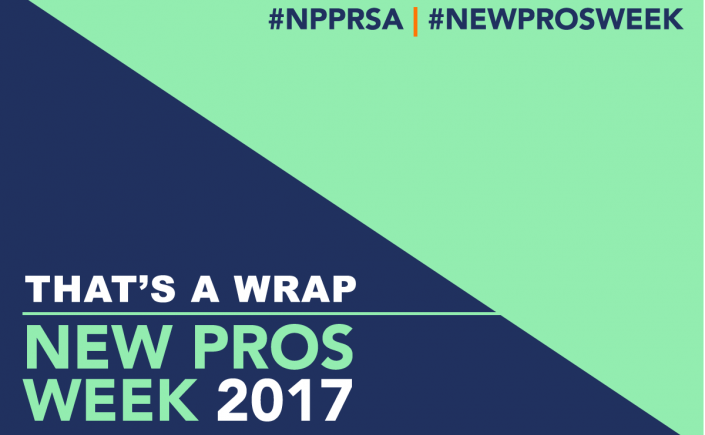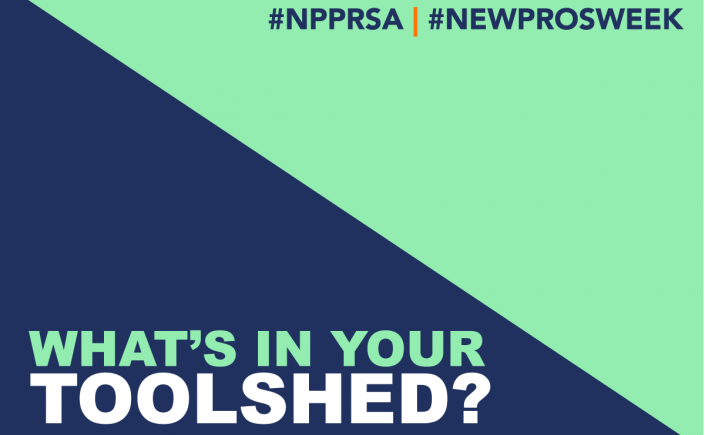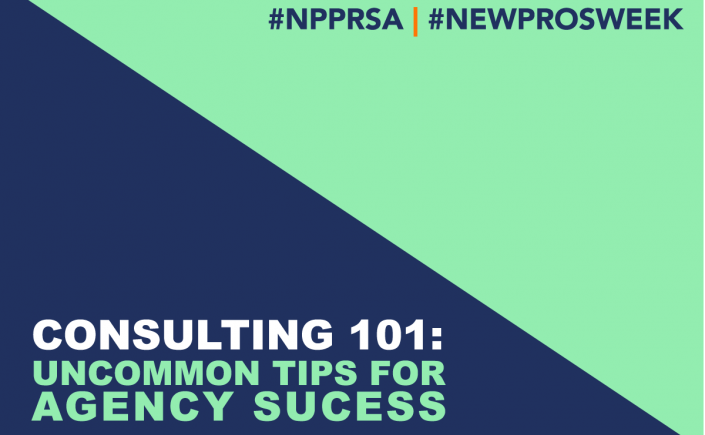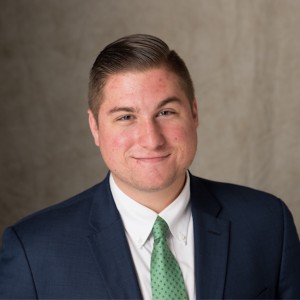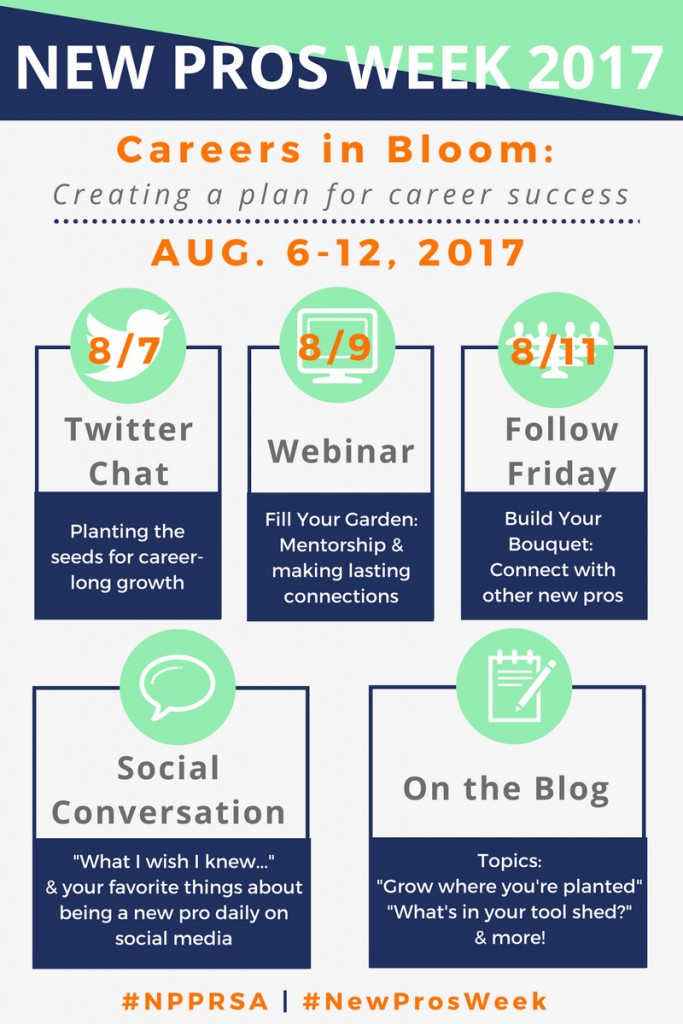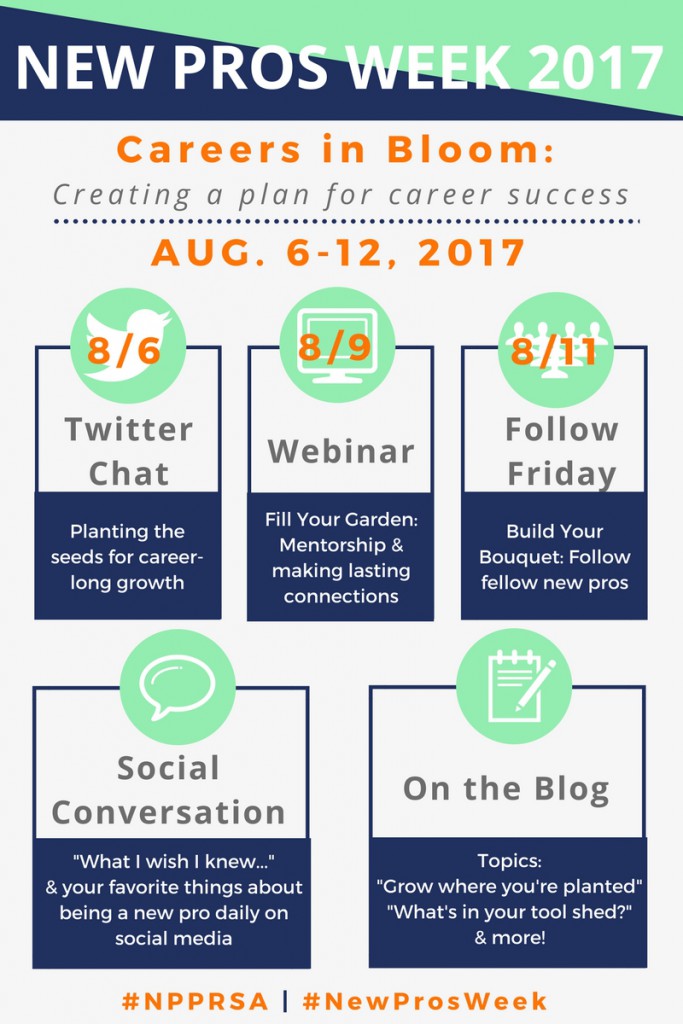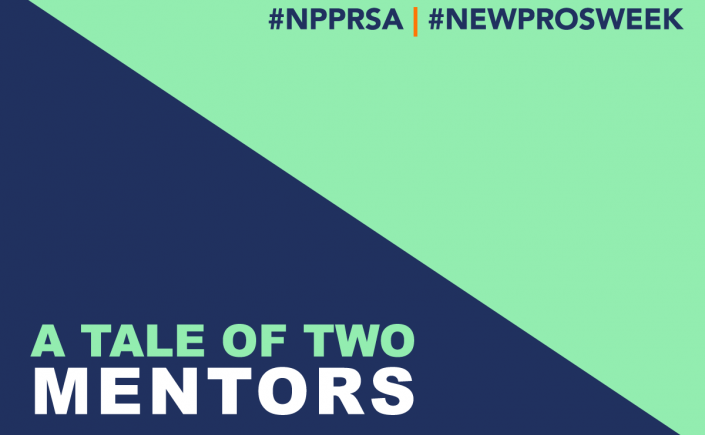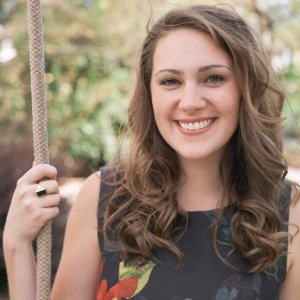When we began planning New Pros Week, we began discussing what kind of theme would best tie everything together and give members concrete advice and next steps once the week was over. As we mulled topics over for different programs, there were a few things we kept coming back to: what do New Pros need to be successful and what do we wish we had known before we entered the working world.
The answers to both of these questions are key to professional growth, the theme we decided on for New Pros Week 2017. To gather the best advice we could, we asked New Pros from all over to share their insight with us and the wider New Pros network. Below is advice from fellow New Pros.
What tools & skills do New Pros need in their toolshed?
New Pros need to be curious, whether it’s staying on top of new trends in the industry or learning a new skill, the genuine desire to learn something new everyday will keep you at the top of your game. I think it’s also incredibly important for PR pros to be level-headed and solution-oriented. PR is a balancing act of ever-changing priorities, client expectations, personal workloads, among other things. A calm demeanor and inquisitive attitude will definitely help you conquer any challenge thrown your way. Arielle Schrader, NYC
“New Pros need to know how to manage several projects at once and prioritize things.” – Alyssa Thys, Atlanta
“PR pros need to know how to write!, AP style, understand social media, be able to see things from multiple perspectives, and be proactive.” – Laura Fooks, Dallas
“New Pros need to be willing to learn and ask questions of professionals who have been in the business longer than you.” – Ruthann Campbell, Tallahassee
“New pros need to be self-starters and pick up new skills quickly – especially in agencies. Things change rapidly and you have to be proactive about keeping up.” – Veronica Mingrone, NYC
“I consider two skills to be most vital. First, writing. You need to communicate clearly, and effectively to your co-workers, clients, and consumers. Second, decision making. This is particularly important if you want to be an effective leader.” – Anne Deady, Houston
“The greatest skill New Pros, and PR pros in general, can use to their advantage is the thirst for lifelong learning. Many people get busy and don’t take the time to stay on top of certain trends or target audiences. If you make learning a daily habit, and seek out others who push and encourage you to learn, you’ll find great success! Additionally, seek out things that make you uncomfortable. If you’re comfortable you may have fallen into some complacency which doesn’t encourage learning (see above point). If you always push yourself into strategically uncomfortable situations, you’ll demonstrate a willingness to go above and beyond!” – Greg Rokisky, Lansing
“It seems like the landscape of PR is drastically changing. So fast that it’s hard to keep up. New Pros need to have two skills: curiosity and persistence. I call them skills because I believe they can be fostered. Curiosity keeps you asking “why” and persistence “how.” Develop these two and you cannot fail.” – Seth Kingdon, Charlotte
“Write well. This doesn’t apply only to media materials, but everything involving words – emails, presentations, social media and so on. Beyond spelling and grammar, being creative and concise are key.” – Natalie Bailey, Charlotte
“The most important career skill is the ability to learn and adapt quickly. In a media environment disrupted by technology, young PR pros must demonstrate their ability and commitment to mastering new skills all the time. There is also a tremendous amount of media to consume. New Pros should be experts at synthesizing this information and developing relevant client recommendations.” – Peter Walpole, NYC
“I think an incredibly valuable skill for new pros to have is self-awareness. Be aware of your strengths and weaknesses and understand what your value add can be from both a client and internal perspective. Once you hone in on your strengths, it will become easier to work on your weaknesses and help you become a more well-rounded professional.” – Annelise Campbell, NYC
“I think the number one skill to be successful in PR is writing. From news releases to blog posts and even 140-character tweets, it’s so important to be able to communicate clearly and engage your audience.” – Caitlyn Ryan, Charlotte
What do you wish you had known before that may have helped you grow where you were planted in your first job?
“Find and be a mentor. Maintaining relationships in a variety of fields – not just PR – can be meaningful when you need advice or a reference, and there is nothing more rewarding than helping someone else be successful. It’s important to have someone ahead of and behind you on the career jungle gym that can offer a different perspective and help you navigate your journey.” – Natalie Bailey, Charlotte
“In an agency setting, don’t always pine after the accounts you think you’d be good at – keep an open mind and an eager attitude and you may surprise yourself. When I first started out, I was determined to work with clients that I already had an interest in. When I joined a technology-focused team (an area I had zero experience in), I found myself learning and loving the industry more than I thought I would. It’s important to expand your creative boundaries and stepping outside your comfort zone is a great way to do so!” – Paige Raiczyk, NYC
“I wish I was reminded that there are many different, unique paths to success, especially in such a vast industry like PR. My biggest advice to New Prosentering the working world? Determine what success means to you individually, then work really hard to accomplish your goals. There’s no need to directly compare your path to anyone else’s and, remember, every experience is valuable.” – Arielle Schrader, NYC
“Before I entered the working world, I wish I really knew the power of networking. If I could go back in time, I would have joined my local PRSA chapter immediately. It’s invaluable.”– Caitlyn Ryan, Charlotte
“I wish I would have known that life as a new pro goes quick, so say yes to as much as you can while you have the time. The more you grow as a professional, the more responsibility you take on and the less you can say yes to. Entering the working world means you have the freedom to explore and find your likes, dislikes, side projects and more!” – Greg Rokisky, Lansing
“Beware of the office gossiper.” – Alyssa Thys, Atlanta
“There are high levels of turnover throughout the PR industry, particularly in junior-level roles. The lesson here is that your best network is the people around you. It is critical to build strong relationships with your colleagues, including those you intern with. The industry becomes smaller as you advance in your career and if you’re lucky, you will likely work with many of these people again down the road.” – Peter Walpole, NYC
“The more you learn, the more you will be asked to do. Learn how to prioritize and say “no” when you can’t keep up with your current workload.” – Ruthann Campbell, Tallahassee
“Don’t be afraid to ask for help! In agency life things can get extremely hectic. If you have too much on your plate, seek out a more senior person for help. Chances are a senior person can offer advice and solutions that you may not have considered. If you are feeling very overwhelmed, get in the habit of communicating it before you burn yourself out.” – Annelise Campbell, NYC
“You need to adapt to your surroundings and be open to change. Be fluid. Sometimes you will be handed a task you are not crazy about – but it will grow your skillset and boost your value.” – Anne Deady, Houston
“I wish I would’ve had a better understanding of analytics, Google AdWords and web development.” – Laura Fooks, Dallas
“Your career is a marathon, not a sprint. Even if you don’t know exactly what you want to do, take every opportunity possible to learn and network. You’ll end up finding your place in the industry sooner than you think.” – Veronica Mingrone, NYC
What’s the best advice you have for other New Pros? What skills do you think are essential? Comment below or tweet at us!

